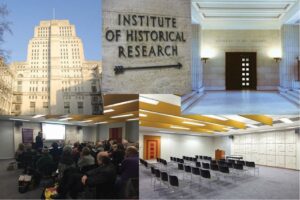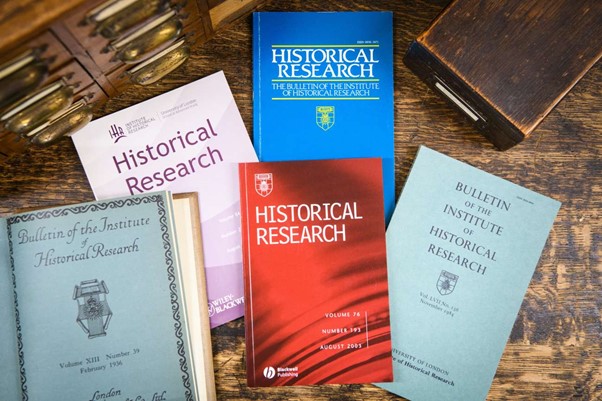This is the first in a series of blog posts by current and former post-graduate students of the Institute to mark the Institute’s centenary. They will offer different personal perspectives on the student experience at the Institute over the last hundred years.
Duncan Gager, Alumnus Fellow, Institute of Historical Research. (Graduated in March 2021)
‘From Vision to Reality – The Creation of the History Laboratory’
 1904 Albert F. Pollard, the leading scholar of the Tudor period of his generation and one of the founders of the Historical Association, set out his vision for a post-graduate school of research in history in his inaugural address as a newly appointed professor at University College. He saw London as its natural home. Close to the vast primary and secondary sources of the Public Record Office (now the National Archives at Kew) and the British Museum library (now the British Library), the school would have unrivalled access to the material required to write the histories of Britain and its Empire. A national institution based in the capital would be a centre of excellence for the entire historical profession. It was ‘a void clamouring to be filled … the unique opportunity for a post-graduate school of research in the London University’.
1904 Albert F. Pollard, the leading scholar of the Tudor period of his generation and one of the founders of the Historical Association, set out his vision for a post-graduate school of research in history in his inaugural address as a newly appointed professor at University College. He saw London as its natural home. Close to the vast primary and secondary sources of the Public Record Office (now the National Archives at Kew) and the British Museum library (now the British Library), the school would have unrivalled access to the material required to write the histories of Britain and its Empire. A national institution based in the capital would be a centre of excellence for the entire historical profession. It was ‘a void clamouring to be filled … the unique opportunity for a post-graduate school of research in the London University’.
Pollard’s voice was a lone one at the beginning of the twentieth century. F.M.L. Thompson, a later director of the Institute, described the teaching of history at the time as ‘a sickly plant, largely left as a tiresome extra chore for whoever chanced to be teaching classics or English.’ It was a problem compounded by the subordinate status of University of London to Oxford and Cambridge, where ‘among the consumers of higher education, London’s student body was continually creamed off by Oxbridge; and among the producers, the great majority of London’s teachers were supplied by Oxbridge.’ As a result, Pollard’s pioneering vision was not to be realized until after the Great War and government intervention in the form of the involvement of the Board of Education.
The First World War and its aftermath had highlighted, in Pollard’s words, ‘the national importance of… bringing to bear upon present problems the light of historical knowledge and experience’. And so, on 8 July 1921 the Institute of Historical Research opened its doors. At the inauguration the historian and President of the Board of Education, H.A.L. Fisher declared that ‘history is an important branch of education and an indispensable instrument of general culture’ and the foundation of the Institute marked ‘a notable stage in the development of historical studies in this country’. With these lofty aims and ambitions, Professor Pollard was confirmed as the Institute’s first Director and with the investment of £20,000 (c. £500,000 today), the Institute took physical shape in temporary huts in Malet Street on the current site of Birkbeck College.
From the beginning, Pollard saw the Institute as existing ‘to fertilise the use of London’s archives, to train students how to find what they want and use it when found’. It was less ‘a place where students do their research than one in which they learn how to do it and discuss its meaning and value when done’. He conceived it as ‘a laboratory rather than a factory, and in its seminars it is seeds that are sown and tested rather than fields that are ploughed or harvests reaped’. This has continued to be the defining and enduring ethos of the Institute. It has remained a place for students to learn the tools and techniques of historical research, a place to participate in seminars across the entire breadth of the historical spectrum and a place to meet and engage in scholarly discussion with other researchers, students as well as the great and the good of the historical profession.
Due to this successful recipe, since its foundation the Institute has occupied a distinctive and unique position in the academic firmament. Sir Douglas Logan, Principal of London University in the late 1940s, described it and its sister Institutes in the School of Advanced Study as ‘the jewels in the crown of London University’. Unencumbered by responsibilities for undergraduate teaching, here resided communities of scholars that transcended university boundaries and created national and international centres of excellence in their respective fields. The post-graduate students formed part of this community, absorbed its atmosphere and learnt their craft.
While the essence of the student experience has remained the same over the last hundred years, how it has been experienced has not. The Institute’s students have, unsurprisingly, not been immune to the social and cultural upheavals of the last century, as we have moved from the Jazz to the Digital Age. In Pollard’s day, the weekly highlight was his Thursday evening conference sessions. These were preceded by dinner (2s 6d for three course and coffee [c.£3.50 today]) and took the form of an informal discussion in comfy chairs in the English History room. Indeed, this genteel style of an older age long remained the hallmark of the Institute. A visiting American professor in the mid-1950s remarked that ‘when one entered the doors of the Institute of Historical Research, one found oneself in a world far removed in atmosphere from that of American universities … There were polite attendants who ushered one in and out of the entrance doors with the bearing of gentlemen’s gentlemen who had joined the Institute after years of service at an Edwardian country house’.
Times were to be a-changing. With the publication in 1963 of the Robbins report on the future of higher education in Britain, impetus was given to the expansion of the university sector. Further, the report concluded that university places ‘should be available to all who were qualified for them by ability and attainment’. Greater numbers and a wider social spectrum across the student population were to be found at all universities, including the Institute. Student numbers and published theses had doubled by the mid-1980s. This, in turn, complemented and coincided with the expansion and growing professionalism of the Institute’s activities.
The Institute had taken on the work of the Victoria County History series early in its life, in 1932 and set out reviving interest in local history studies. In addition, it had a clear and obvious remit to promote interest in the history of London, which culminated in the creation of the Centre for Metropolitan History in 1987. (Today, these have been brought together to form part of the Centre for the History of People, Place and Community). Staff numbers have steadily increased over the last hundred years to meet these demands, as well as those of the students for training courses and research materials and established academics for seminars and conferences. For the student, there have been three unchanging focal points for all this activity: the Common Room, the seminars and the Wohl Library.
The former represented a sociable oasis from the rigours of solitary research in one of London’s many libraries and archives. A place for tea and sandwiches with fellow students and an opportunity to meet and engage with established members of the historical profession. More dauntingly, the same opportunity presented itself at the Institute’s wide range of seminars. Professors, lecturers, teachers and students all gathered together to discuss an historical topic or subject. The seminars were filled with lively discussion and formidable characters, an excellent apprenticeship for the trainee historian. Finally, there was always refuge in the Institute’s Library, though this was not a place of comfy armchairs. One visitor described it as ‘architecturally austere, reflecting clearly the ideals of its founders, scientific history … strictly ordered guides… standing on their steel shelves as Prussian regiments on parade’.
Yet, as I write, this historical continuity of the student experience has been broken, hopefully temporarily, by the disruptive force of the pandemic. It has not been without a silver lining for historical research as new approaches have emerged. However, the Common Room is sadly bereft of tea and people, the seminars have moved online and the library is even quieter than usual. But, to quote the Bible and George Harrison and as all students of history know, ‘all things must pass’. As the Institute begins a new century, one looks forward to the History Laboratory on Malet Street continuing to be as successful in forging new ways of studying, researching and teaching history and turning students into scholars as Pollard intended.

